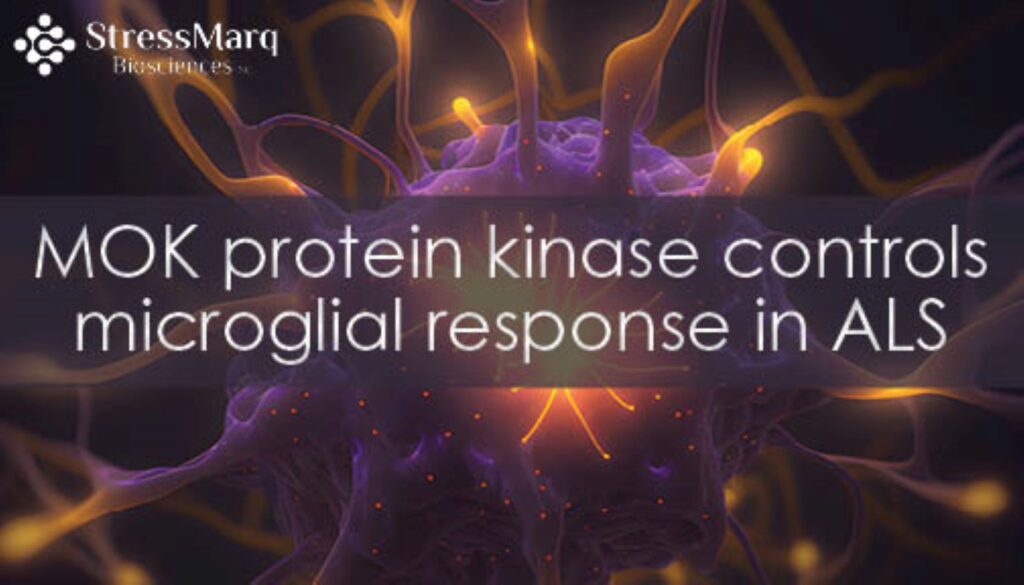MOK protein kinase controls microglial response in Amyotrophic Lateral Sclerosis (ALS)
Amyotrophic lateral sclerosis (ALS), also known as Lou Gehrig’s Disease, is a progressive neurodegenerative disease that causes motor neurons in the cortex, brain stem and spinal cord to degenerate and die. Neuronal death in ALS is also influenced by non-neuronal cells such as microglial cells. Microglia are the main defense cells in the central nervous system (CNS), which respond first to infections or neuronal injury. In ALS, microglia become activated by the presence of cytosolic aggregates of TAR DNA-binding protein 43 (TDP-43). A persistently reactive state leads to the release of pro-inflammatory cytokines, which are neurotoxic and contribute to motor neuron loss and disease in ALS.
An international collaborative study published in PNAS has now uncovered that MAPK/MAK/MRK overlapping kinase (MOK) is responsible for controlling the activation of microglial cells in the presence of TDP-43. In ALS conditions, MOK levels are increased. Targeting the MOK with a chemical MOK inhibitor has been shown to suppress microglia activation and delay ALS disease onset1.
MOK controls microglia by regulating inflammatory pathways
MOK was shown to participate in the inflammatory response in microglia cells. For this, cytokine levels were analyzed following pro-inflammatory stimulation in CRISPR/Cas9-generated MOK-KO and wildtype microglia cells using qPCR and ELISA. The results were confirmed with flow cytometry, where MOK was labeled with a bi-phosphorylated (pThr159+pTyr161) MOK antibody from StressMarq Biosciences (catalog# SPC-1030). Depletion of MOK resulted in reduced cytokine production in microglia upon external stimulation. This effect could be reversed or rescued by expressing recombinant wildtype MOK. In contrast, the expression of a recombinant form lacking the kinase domain was unable to rescue the phenotype. Therefore, the kinase domain of MOK was critical for cytokine expression and inflammatory response in microglia.

Figure 1. Activation of microglial cells in response to inflammatory stimulus.
MOK kinase can phosphorylate several MAP kinases and undergo auto-phosphorylation. To examine whether phosphorylated protein networks were regulated by MOK in an ALS context, immunoprecipitation experiments were performed using microglial cells. The presence of TDP-43 aggregates was crucial in mobilizing MOK kinase complexes. Bromodomain-containing protein 4 (Brd4) — the epigenetic reader that acts as a transcriptional regulator to activate an inflammatory response — was found in the MOK-TDP-43 phosphorylated protein network. MOK could also support nuclear levels of phosphorylated Brd4 and control the binding of Brd4 to cytokine gene promoters including IL-6, IFNb, and TNFα.
Dysregulated MOK microglial levels in ALS
The disease-causing role of MOK was then investigated. Human spinal cord tissue samples of ALS patients displayed elevated MOK levels, especially in microglial cells. Elevated levels of MOK were also seen in a SOD1G93A mouse model of ALS. To examine whether MOK can serve as a therapeutic target of ALS, a chemical MOK inhibitor, C13, was used to treat the ALS mouse model. The MOK inhibitor successfully suppressed microglial activation and delayed disease onset.
StressMarq products for ALS research
StressMarq is a leading provider of proteins and antibodies for neurodegenerative disease research. In the study by Pérez-Cabello et al., StressMarq’s (pThr159+pTyr161) MOK antibody (catalog# SPC-1030) antibody was used to investigate the role of MOK in the inflammatory response in microglial. The study identified how MOK interacts with TDP-43, implicating Brd4 to regulate cytokine production. As MOK levels and immune functions are dysregulated in ALS, chemical inhibition of MOK could suppress microglial activation and improve outcomes for this disease. This study defines a new therapeutic target for ALS, alongside potentially broader applications in other inflammation-related disorders.
StressMarq manufactures a broad range of products to study neurodegenerative diseases. StressMarq’s SOD Monomers (catalog# SPR-435) and SOD Pre-formed Fibrils (PFFs) (catalog# SPR-470) can be used for studying the misfolding and aggregation of SOD1 into neurotoxic species implicated in ALS.
Reference
- MAPK/MAK/MRK overlapping kinase (MOK) controls microglial inflammatory/type-I IFN responses via Brd4 and is involved in ALS pathophysiology. Pérez-Cabello, J. A et al. PNAS. 2023; 120 (28) e2302143120


Leave a Reply